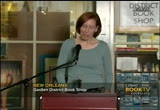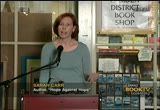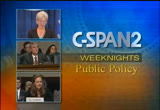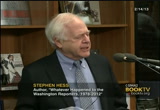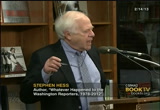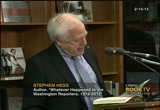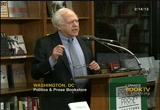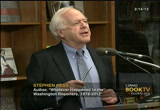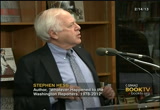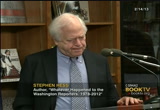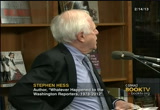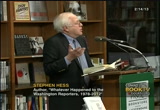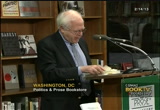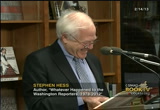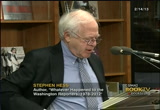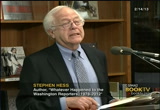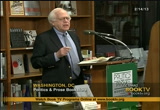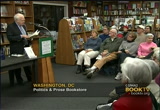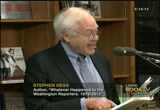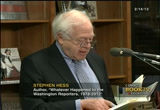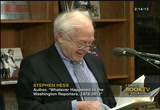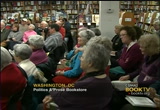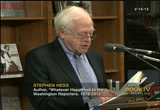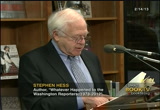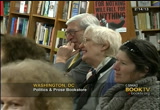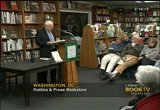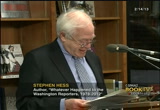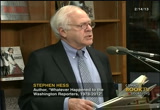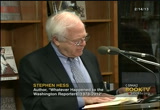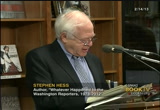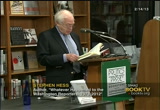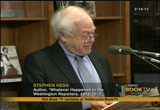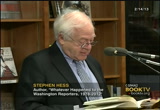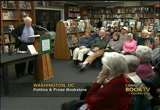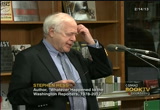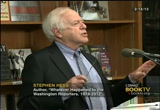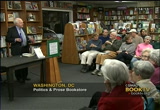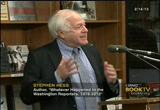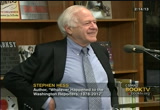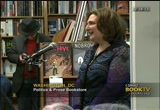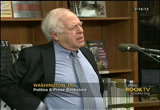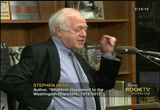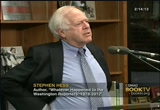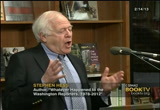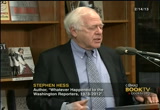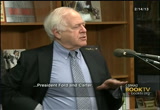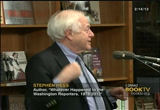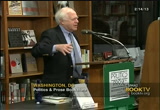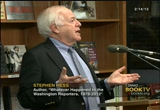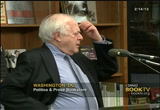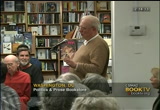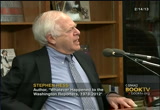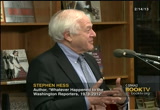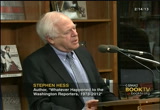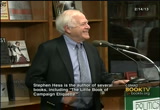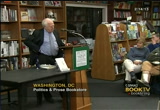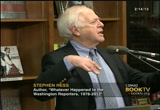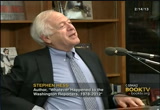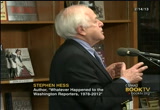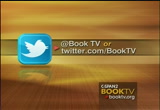tv Book TV CSPAN March 23, 2013 3:30pm-4:30pm EDT
3:30 pm
thinking and original thought and sort of the ability to study and learn about what interests you and have sort of a self-directed education that on some foundational level are really important and that's critical thinking i think the best things my own education gave me. i think it's increasingly hard to sort of live up to that ideal, just with the burdens placed on schools today, surrounding standardized testing, and standardized testing is something i have incredibly milked feelings about. i feel like we need to have a way of measuring school progresses and schools that persistently fail kids over years and generations, need to be held accountable to that. but it also makes it very hard for schools to develop and
3:31 pm
sustain vibrant art programs and music programs and to kind of have the educational offers that reach the appeal of tie versety of kids out there. i don't envy school administrators for having to figure that all out. does that answer your question? >> if you don't hey -- you don't have any further questions, thank you for the great presentation. [applause]
3:32 pm
>> in 1978, steven hess surveyed 450 journalists covering the federal government for u.s. news organizations. over 30 years later, the author now a senior fellow emarry at that time at the brookings institute visits former subjects to see how things have changed in their careers and journalism in general. this is about an hour. >> senator rubio, i better drink my water first. >> this is very exciting for me, for my wife, because we were friends of karla and david coen. feel we were here at the creation of politics and prose, and the incredible job they did and the idea there would be a second act would be so creative
3:33 pm
and so exciting under brad and lisa. just means a lot to us. i'm very, very pleased that you would come out on valentine's day. i love you all. in fact i brought pens that are red. i will sign all books with red pens and put in a heart and an xo, hugs and kisses, as well. if you wish them. and the ancient history behind this book has been largely told by brad and his introduction. i did come to brookings in 1972 after being on the white house staff of two presidents. obviously i was going to be the presidency man in 1976, i wrote a book called "organizing the presidency" which basically said all i wanted to say at that time and i had to look around for
3:34 pm
another subject, and i decided i would do the washington press, press is what we used to call -- called the media now. we called it the press at the time. and it was a survey of 450, and then got more elaborate. enough what is terribly interesting to me -- this is very exciting -- a young woman came up to me a few minutes ago, and she had this book, the original book, because she had just had it reprinted, the back of the shop. by the way, it looks better than the original. i am very excited. she told me who she was and she was one of the five interns in the summer of 1978 who did the basic studies. she was from stanford. she was the odd woman out. the others were all from harvard. she told me how it changed her life. she became a writer of that as
3:35 pm
well. i have self -- several of my enters here now and i just listened the story. that's how life goes. and so it got me so interested that i decided that book -- i would call it the news work, the first of a series, and it has been such exciting -- the second book was the -- took -- spend the year inside five government press offices, white house, state department, pentagon, food and drug administration, department of transportation, and you never know when you write a book. while i'm there with the department -- at the department of transportation, with the secretary, and the snow is falling, and we look out the window and a plane has crashed into the 14th street bridge. you remember that. and we're there, and i am there to write everything that the government does if it turns into
3:36 pm
a crisis. again, we did one on the house of -- on the senate first, spent a year wandering around inside the senate. senators walk a lot. they have to go from -- are their offices in the capitol, and i found if i just -- instead of making appointments with them. i just walk with them, i could get all the interviews i wanted. and i just introduced myself and say, i'm writing a book about the press, and i say, senator, you know reporters are going to but an adjective in front of your name. what adjective would you like in front of your name. they had never been asked that question before so they stopped and thought about and it sometimes the conversation weapon on for 15 or 20 minutes you. know what adjective they chose most? hard-working. hard-working john, neil, that sort of thing. wonderful times. we did another on the house, and then beth and i had an opportunity to basically go around the world, do one of
3:37 pm
foreign correspondents, how they cover the rest of the world for the united states, i can remember being with john from the washington post, in istanbul. he had just come in from kurdistan for the weekend. i said, john, what's your trick for staying alive? and he said, don't wash your car. oh. i asked you for survival technique and you said don't quash your car, he said if anybody is going to my a bomb under it there will be fingerprints on it. don't wash your car. so obviously having done that on the -- how we covered the world, i did through their eyes how the rest of the world covers us, and we now hey reached the point where there would be a final book, clearly after all these books, a final book is supposed to be the future, but i haven't
3:38 pm
the faint's idea what the future of the media will be. so instead i went back to the beginning. i'm also a professor at gw so besides my enters, i had wonderful and energetic students and we went out and find 079% -- 90% of the 450. i should say they were in 19 states, in england, france, italy, new zealand, australia, 283 we actually did transcribe interviews with. all the material will be given to the library of congress, be in the manuscript so future generations can compare it for how it will be in the future. so, one thing i should advise and warp you -- warn you abouts, this isn't like your high school yearbook, the class of 1978.
3:39 pm
these people were all different. oldest was 80. the youngest was 21. what they had in common was that at a moment in 1978, they were all in washington covering national government for u.s. commercial operations. and that made it a little tricky in how you would organize it. basically this book is a series of discrete essays on different parts of this mix, and then the end we bring it all together and count the people one-by-one and reach a conclusion which makes this the first book that is about career patterns in journalism. so let me start, the first book, the first chapter, would be the world war ii generation. the g.i. bill people who came here, and it was a very clear pattern. they went out someplace to omaha, to des moines, they served their time, they were
3:40 pm
brought to washington, they spent the rest of their career in washington, they retired -- not that they had to but they did at that time -- at 65. wrong book. pick up where we are in the right book. give you -- i'm going to give you snippets from each of these particular sections to get a feel for itful this is in that first chapter about darwin olaf son of the omaha world herald and how he came to washington in 1950. he had been assigned in omaha to cover the first big snowstorm of the season, and so he went out to get some image of the children playing and the light flakes and so forthbut he found they were all cold and shriveling in an elementary school plopped. so he -- playground and so he started a snow alabama fight and
3:41 pm
the kids love it and he said before i could get back in the nutroom the school program called or executive editor and accused me of threatening the health and welfare of an entire new generation. shortly thereafter the executive editor called me and said he thought i would do better in an unstable environment. he was sending me to washington. so that was the first. if you move on to women, this becomes a difficult and a different chapter because there were only 20% of the original group or women. you could not do the same thing of just measuring them. so our brave researchers went out and kept interviewing women right through, until we got a pattern of women, from 1978 to the present. now, get to -- this is what it really sort of looked like in the beginning.
3:42 pm
and it's pretty dismal. okay. this is judy woodruff, and she graduates from duke in 1968. and she says: my spring break i went to atlanta. i interviewed with all three affiliate news directors, two of them barely gave me the time of day. the third, an abc affiliate news director, this was the station that was doing one newscast over the weekend, he said, i could use a gopher, a news room secretary. you can answer the phone, pick up my mail. i worked for them for a year and a half. the last six months they hired me to do the 11:00 p.m. sunday night weather. it was like a cinderella story. during the week i would come in and be a secretary in the newsroom and then on sunday night, i would come in at 6:00 p.m. and for five hours i would pour over the weather wires and then i learned how to do the weather.
3:43 pm
right after that i say, nina, trying to break in, in boston, and she would go in and they would say, we have our woman. that was my favorite. we have our woman. that was all the time we have our woman. but i'm going to give you -- we're going to get to the end of the chapter because it's a valentine's story and you'll see why. this is what happens after you go through discrimination and family and balance and the really remarkable career of a woman named june of the wall street journal, and she started in the dallas bureau of the wall street journal in 1976. very macho place. five years later i was september to rhodesia to cover the end of the independence war and i was given the african beat. so i did that for a couple years, and then i was asked to develop a beat on third world
3:44 pm
issues. then in 1983 i came back to be bureau chief in boston, and 85 i went to hong kong to be bureau chief, caught the revolution in the philippines and returned to washington to be the deputy bureau chief in 1987. now, here's a unique twist. she marries an american diplomat who leaves journalism for seven years, she says to our interviewer, you're going to get marry when you fall in love. you really are. you're not going to decide i'm going to wait 15 years to get married. you're going to do it when your heart tells you to do it. so it just happens that i didn't get married until i was 40, and i had my children at 41 and 42. it's not bus i planned it that way. that's just the way it happened. 1997, she returned to the wall street journal here in washington, and when we interviewed her in 2006, she had her kids were 16 and 17. she had adjusted to a schedule of four days a week and she
3:45 pm
says, we've got college night tonight. so i go home, about 6:30, which is a little early for me. you just have to set your priorities. this is a fairly family friendly place. everybody has kids around the same age, and no one will races an eyebrow if you have to take off to do a college tour or or a kid's baseball gail. arch recognize is when the story is hot you work hard, and hen when the story cools rough you can take time. i you just do it. it's what being a woman is all about. by the way, let me say something. every brew very by one of our students is chronicled in the back with the name of the student. this one was done by christine grimaldi, and i don't think i could have gotten that information from june. that was clearly something she was saying to a young woman who wanted to be a journalist. and she was quite nice.
3:46 pm
way now good from the world war ii generation to the boomer generation. and here things are starting to change in a major way. in the first time they stuck with one job, one employer, and retired. now they start to change jobs. now they start to change types of media. and i give you two examples of this quickly. okay. this is elliott house who went from the dallas morning news to the wall street journal in 1984. and she says, one of the stories i did that i think made the journal want to hire me was during watergate. it was a young man named bud crowe who was working at the white house who was one of the low level people that got in trouble and got sentenced to prison. the day he was leaving the court i called the white house and asked to speak to him. of course you're from the dallas morning news so nobody wants to talk to you. but my picture happened to have
3:47 pm
been on the front page of "the new york times" standing behind him so i said to him, i'm that woman whose picture is in the paper standing behind you. i want to talk to you, how you tell your kids how you're going to prison. he said i don't think i whatnot to -- i want to talk and he put me off and that evening i was driving past the white house at night, with my boyfriend, and i saw him walking, and i screamed, stop the car. and i got out of the car and just went up to him and said, i'm that woman that called you today and i want to talk to you. he said, well, i'm taking my last walk around the white house. so i just started walking with him. we walked down 17th street, around at the ellipse and me quizzing him the whole way. last walk around the white house. and he talked about how he used to run out the and then he got into how his children had seen him on television and what he was going to tell them. if i do say so myself it was a
3:48 pm
great human interest feature. the dallas morning news ran it. the think the dallas bureau chief saw it. anyway, i went to the wall street journal. the other one is -- by the way, she retired as publisher of the wall street journal. the next one is from lisa meyers. and the difference there is she didn't go from one job to the other specifically. she went from one type of media to another. she went from print to tv. and here's how she tells the story. i never at any particular point decided i was going to be on television. i was invited to do a couple of panels on "meet the mess" and "face the nation" which i found nerve wracking and i could hardly breathe. the think that made the difference for me, a news conference, i was covering the carter white house. i hadn't been covering the white house long. perhaps president carter thought
3:49 pm
i was a sweet young then, and at the end of the news conference they look for softballs softbald president carter called on me and i asked him about some allegations he made about governor reagan having injected racism into the presidential campaign. the president basically blew me off and says, look, i never made such an allegation, something like that. i stood the and reasked the question. at this point he it toly denied -- totally denied he said such a thing. after the news conference lessry stahl ran up to me and said, tell your parents to watch tv, and all the evening news shows i was asking a question of the president and him basically providing not terribly straightforward answer and then the networks roll the tape of him saying exactly what i said he had said. so that was the moment that propelled me into television. lisa meyers became the chief investigative correspondent for
3:50 pm
nbc. okay. we moved on to chapter that i call -- call "in the right or wrong place." has to do with whether you happen to work for the washington star or the washington post. you happen to work for upi or ap. and it starts with another -- it's interesting that so many of these i hadn't realized what i was doing. were about women who were saying this. just more interesting of how about that. washington star, which had once been the paper of record here, ceased publication on august 7, 1981. and this is what roberta draper said. aside from my husband's death,
3:51 pm
the day the washington star folded was the worst day of my life. i had no notice. my boss called at 6:00 a.m. to tell me so i wouldn't hear it on the radio. so i walked to the kitchen and made myself a manhattan. i thought, how many times do you have a death in the family? it was intense. i had been there since 1957. i started out as a copy boy. it was other wonderful place to work, even though it was conservative because they gave reporters absolute free rein. no one told you what you had to do. she then says a friend from nbc called with a job offer. i became anywhere senate producer which is a euphemism for off camera. i did al the tuesday lurches and press conferences and wrote memos and told the reporters what to report. i stayed there for nearly 20 years. now, that's when in the right or wrong place. i thought i'd also say what happens when you're right, sometimes your in the right or
3:52 pm
wrong place to write a story. and this is ike pappas at cbs. dallas police headquarters. 1963. i entered the basement of the dallas police headquarters. i didn't know where i was going to stand to try to report this story, the departure of oswald, so i found a little spot by the fender of the chase car and i squeezed in and didn't realize it but i was squeezing squeezint from front ofjack rub by and i saw this man jump in front of me and there was a bang and a flat on oswald's sweater and amen and -- a moen and then he went down. i thought could this possibly be the assays nation of the united states president being killed? put that in words, and that's just what i saw.
3:53 pm
>> i'm going to move on to networks. i hadn't planned to do this. but i happen to see somebody in the audience who happened to be there and happened to be a very good interviewer as well as a friend. just a snippet from somebody named marvin kalb. you may be wondering, of you have a long memory, why marvin kalb, who was cbs's chief diplomatic correspondent, in 1980, suddenly switched over to nbc. now, the true story, if he wants to contribute me he can but these are in his words. in 1975, i was out of work for eight months bus of a bad back. bill small, the bureau chief of cbs, used to visit me at home. after a couple months i said to him, take me off salary because
3:54 pm
i'm not doing anything for your network. i'm just lying here. and he said, no. and he was going to keep me on full salary. i said, do it on half. nope, full salary until you get batter, and that was eight months, and i never forgot that. and in 1980, when he became president of nbc, and he called me and he said, i'd like you to come over here, i knew that i owed bill, so i went. that the story. by the way, his brother, who i had hoped was going to be here tonight, we exchanged e-mails today, bernie -- he also went with -- to nbc and he told me he really did it to be with marvin and called it sibling love. appears constantly in the book because he does so many things. i want to do a little more on networks because there are some tricky things -- how are we doing on time?
3:55 pm
okay. not everybody was happy, particularly those who had -- who were specialist, and i happened to interview the three specialists, all of whom were lawyers and all of whom were covering the supreme court and all of whom turned to be out of sync with their networks and all of whom left. just i might -- i'll read one. carl stern, who was nbc. and he said, the principle problem was what had been a reporter's business became a producer's business. the principle producer to whom i reported in new york had very strong views as to what she thought the court was doing. which occasionally did parallel what the court was doing but not all the. she would change my copy and i would say, they didn't say that. she'd say, about it means the same thing and people will understand it better. frequently it reached the point where i didn't belief half the
3:56 pm
things i was saying on the air. not that they were false but it was inaccurate. i had this phone call from steven freedman, the evening news' senior executive, balling me out. he said i've had this firness bullshit up to here. it's not whether we're fair in this or that story. what matters is we're favor overall. and i asked carl, how can you bet to be fair overall in at it like the guy with one foot in boiling water and one foot in ice water. on average he is comfortable. it just became an interly different -- entirely different business and he went on to be the spokesman for the attorney general janet recent o', -- reno and a prefer at george washington university. i won't read the other, ted graham and tim o'bryan's stories are equally troubling. i want to good on to "the new york times."
3:57 pm
which is really by far my favorite chapter. and is the most -- chapter that is truly sort of -- studs turkle, from one story to the other. i interviewed 17 out of 30 reporters there and so you get the whole going from rick, the bureau chief, on to rich, who covered the national security council, steve roberts, and marty schulte who were alternating congress and white house, bernie, the foreign diplomatic correspondent, and they weave in and out. i'll do a long one of marty. primarily because it tells what it was like there without exception if you started in the new york times at that time. marty said, got a bachelor of
3:58 pm
law degree and then i went into the service for two years and came out and took a v.a. course called, how to get a job. the burden of which was something to do -- go for had gone you're interested. and i wrote 110 makes and i was offered copy boy jobs, mailroom jobs. took the one at the new york times. when you got that job, according to the v.a. course, consider at it food in the door and make yourself useful to the people doing the work you've whatnot to do, and some day a task will come and somebody will be on a project or on vacation or sick and they'll look at you and say, what the heck, he knows how to bring us coffee, how to rip copy of off the machine. give the kid a break. i followed that to a t and it worked for me. and he talks about how he moved from copy boy to semi reporter
3:59 pm
at the u.n. burrough, to covering the women's page, to night rewrite to finally being sent to washington as a regional correspondent. that is, covering new york, new jersey, and connecticut. and then finally moving over to cover -- to be part of the bureau where he covered congress. so that had taken 40 years, 20 years in new york, 20 years here. and then he said, i left the times because a new york finance year asked me to start a up in to cover capitol hill. i turned him down and he kept coming back. fortunately i told him, yes, i'm interested. took me six months for them to give me what wanted, which basically was a piece of the action. i would not do this if i did not have an equity interest in it. i spent my life as a reporter. had almost no managerial experience. i had to find an office and a printer and a distributor, and had to hire personnel.
4:00 pm
the hardest thing was in advertising. it was really harrowing. people tell me, you'll never work harder and never have more fun, and in both cases, that's been true. i was then 68 yours old when i started at the hill, and a time when i by rights should have been in a nursing home, right? it took three years before we made a profit. we launched in september, 1994, and just lost $100,000 that year. the next 'er we lost 800,000 but the third year we made a modest profit about 200,000...
4:01 pm
my oldest son was at harvard and majoring in computer science. he said, come look at my computer lab, i went to his computer lab and he had the big machine and it looked impressive to me. i had a mac at home. he said let me show you something, it's the first time i saw the worldwide web. it showed exhibit and had picture and text. as far as i knew the internet was text. i said, james, if you can have text on the computer why can't we have a newspaper on the web? i said that and he said, well, maybe we should something like that? one thing lead to another and
4:02 pm
the times started a task force of online. they put out the first website in january '96, i became the first editor of the website. so i changed completely from the traditional journalist to a website journalist, it was quite an education for me. >> do you want know keep going and going? tell me. let me tell you a little bit about the conclusion. i shouldn't tell you too much. i want do you buy the book. [laughter] this is what happened. to have a book like this, you expect that you're going have a know where it comes out. the reporters at the time told me we were going come out. that is that the journalism a
4:03 pm
high energy, low paying profession. it meant there back point you look a little ahead and your kids are about ready to go to college and you better get some money. that's what i expected in the last chapter when we added up the one by one by one we find something totally the opposite. rather than getting out, they stay in. two-thirds of them are in their for thirty years, fort years, even fifty years. you say how can it be? well, there were two reasons. the main reason that was the world had changed for them and everybody else as well. during this period, spouses, in this case, mostly women, remember was 80/20. that's who you marry. somebody like you. so now their spouse was a psychiatrist or a lawyer or a high government official or a
4:04 pm
lobbiest, now you have two upper middle class salaries or income, and together you can send your kids to college. the second thing you find out runs right through this, the people love what we're doing. they loved it. and the people are love the things they do after they leave the house. these people love what they did in the office. if you didn't have to leave, they didn't. that pacific -- basically was the final story. was it different than today? well, they told me it was a golden age. they told me that in both print and television they were there at the moment important things were happening in the business. obviously, important things were happening in the world. there republican always important things happening the business. it was things happening in television, print, and so forth. so was it a golden age?
4:05 pm
you'll see. there's one person who thought so. bruce morton, i always thought cbs news and cnn and for a television person, i thought he had the most elegant sense as essayist, he said, you know, i think all the old guys always think the good old days were better. the good old dais were better -- days were better. [applause] [laughter] [applause] obviously -- excuse me. it you have questions go to the microphone. if it's not clear, i'll repeat the question for our viewers and c-span. [inaudible] where you started to where it is
4:06 pm
now, do you think or did the people you interview think that these days a completely different kind of news 24/7 blogging which is the kind of reporting you -- different kind of reporting you did. is it the same kind of person or a doing a different thing? >> i talked to young people in journalism school and so forth. obviously they have to learn different tools if you stay in the business. you see the same spark. they will adjust to it if -- and that's why actually this is a very optimistic book, it says there are always going to be people who want to be reporters and will somehow be reporters. it's a tough transitional moment. it it will adjust. it always did. it's already starting to see things every day. you see different things every day. i would say to apps your
4:07 pm
question, that it's tough most for the people who are moving out now. so the people moving in, in some ways it's a remarkable future for them. how many of you read ezra kline, for example? 28 years old, what did he do? a smart guy, obviously. he started a blog. anybody can blog. if you know they have something to say, before you know it, things happen. in that way, it's open to young people, if they can gate foot in our create their own way in. i'm an optimist. >> thank you. >> any other thoughts on that? >> sure. >> this person. thank you. you refer as the research -- it was a pleasure. it was life changing.
4:08 pm
all the interns with you now are fortunate. >> tell me we can afford to do this. what did happen? you say it changed your life. what did you go ton do? >> it was an incredible summer. the contact we with you and brookings lead me to go from stanford to colombia international affairs, and a world of research and writing. i was a prime minister speaker and directer of trade, and many -- i wrote a book that was here some years ago on parented a vote casey advocacy. >> i'm happy to see that. >> i admire you greatly. >> four of my intemps have been president's cabinets. that's a great feeling. let me tell you who they are. it might look well for me. >> in those days we sat at the desk with a phone plugged to the wall and index cards. and you would pull them out and
4:09 pm
go through the list and make phone calls and said you're working with stephen hess they would answer incredible questions. it was unbelievable. you go home and pinch yourself that they spoke to these people. >> thank goodness i'm a pack rat. i saved all of that. i was able to go back to the beginning and start all over. >> and we wrote our thoughts on index cards. not even typewriters. so my two questions would be research method duelings how it's changed and then moving from quantityive to qualityive issues looking at the press and reporting available to people in the information age. "new york times" everything, here but what do you think of the quality of news to the american public on washington? >> well, let me play with the first -- the question of meth duelings. the -- methodologies, when i
4:10 pm
want to study the media, when you think about the center of harvard, you think about the pennsylvania and university of southern california there was nothing there. so you to start with a literature. in 1977, when i started, there was no literature. the last book was a ph.d. disser dissertation from 1935 from the university of chicago later published as a washington correspondent by leo rossman. smart now have get out of business. he told me it sold about 500 copies and wrote the joy of -- and march brother's movie and he did fine. you have to -- invent your own methodologies if you were pursuing this. and partly what we were doing. it was sort of fun go along and
4:11 pm
figure out the best ways to get the answers that you needed. now, of course, become far more social science and methodology doesn't chairng. the questions of accurate -- obviously the joy of the old way you had editors. you had somebody who was looking over your shoulder. in a sense maybe you're you're own editor and you better have the sixth sense. there are other things that are happening that are interesting. i can remember about twenty years ago, i was doing, i think the dianne show a call came in and young woman and she was upset she didn't feel she was finding getting the information she needed to be responsible
4:12 pm
citizens. and i remember saying to her, you know, diet books. diet books are big. i think i should become a media diet write a media diet book. you see i asked you, i only need to know three things. i only need to know how much money you're willing to spend on your media, how much time you are willing to give it to it, and what your interests are. i can put together a diet for you. there's lots of stuffs out there. a nice idea. today we do that. we do that. we do it, i do you it we know what we like. we know the special columnist we go it. we are our own editors. it was always the problem was not for people like you, frankly. that's what the first book showed as well. because there was always news
4:13 pm
out there. the problem was for the people who only an opportunity to dip their toe to the news. i don't know how it changed now. how people are doing more dipping their toe in or not. but they sure have that thing on their desk around their pad and they have the opportunity to do that. so we tend here in washington, where reporters or former reporters or colleagues of ours and friends and worried about what is happening. but it turn it around from the other side and the consumer really is much advantaged. so the consumer of previous generation unless that consumer was a truly involved and wanted to be involved. it's more at your finger trips now. i think that's okay. you pay a price for that. it's unfiltered. so you to coyour own filtering. >> you mentioned that when you did the original interview, 20%
4:14 pm
of the reporters were female. what about in term of ethnic diversity. how much changed now has the female diversity changed over the years or still 20%? >> no, it's 41% now. it's doubled. it depends on the media. news magazines had more, for example. there's a chapter on diversity, but it's largely about blacks. that is not good news. about 4% at that time, and i now estimate it's about 4% today. this is very troubling. when you go through it, you see some things. you see that the talent is clearly there. you see that affirmative action programs have been in place.
4:15 pm
what is happening you get the ones of the bold print like the reliable sources and see in bold print. the pulitzer prices are at the top. when you go below that and you start running in to an absence of the reporters you want there. i think what happens -- because many of the organizations are quite good at picking young people to be on a fast track and people are good. they goat a certain point -- they get to a certain point, some of them, of course, are on demand and they get better jobs and offers. also, they look one step higher who was in the executive suite in they suddenly see that person doesn't look much like them. at that point, i think they start leaving journalism. so that's -- as i wrote in my diversity chapter , by the way,
4:16 pm
it's african-american. i don't get to other minority groups. they weren't there in my original study. >> hi. i know, you mentioned that per the reason you wrote this because there wasn't any previous literature on it. it's a compelling reason, i'm interested in what drew you to write about this and put in the time to interview and report the stories of so many journalists outside of there not being information. why is it important we have the careers of journalists studied and chronicled. what is the significance of that? >> as i say, you see i stumbled in to it. i didn't want to keep repeating myself on the present. i book i wrote was successful. it was brookings book of the month club. i could have spent the rest of my life giving keynote addresses. some do. i didn't want to do that. i looked around for something else.
4:17 pm
i wasn't a journalist or a communications person. it's nice to find something that is open for that, virgin territory, you run with it. i was a writer, and it was just like i talk about journalists having fun. i had fun. it was joyous. i don't think i have to justify it. i think journalism is a pretty important part of our community, a part of our life in a particularly in a democracy. it was stunning that they weren't there. they weren't being told in political science, in journalism schools or trade schools. political science wasn't teaching them because they didn't have the tools to teach them with. you it to have the books. hopefully my book contributed to it. it's amazing the degree they were in part -- i went at some point up to the ken i -- kennedy school, i commuted for three years, and before marvin set up
4:18 pm
the center and so forth, there wasn't anything else up there. it was the kennedy school. teaching people to be our great future leaders. there was nothing in the venue about the journalism. it's a huge gap that the marvin school filled that the point. it wasn't in our lives all that long ago. >> and i also wanted to ask, my friend kelsie and are visiting students here this semester at american journalism for the washington semester. i want to know what you believe that young aspiring journal i guesses or students interested communications could glean from a lot of story you listed in there. because there's so many wonderful stories. its a different landscape from the time when a lot of these individuals to where they started to where we are. >> i'm going push that aside for this reason. i want you to get the book, i
4:19 pm
want you to come by and visit my present intern who is there. probably in your program, and so you adopt need an introduction to me. join the two of us for lunch and we'll go in to why you should be a journalist. is that fair enough? >> thank you. i want to goat the young man behind you. >> good even -- [inaudible] a considerable number of polls. one of the things that was polled was the approval rating among the american people with the media. the good news is those polled -- [inaudible] >> doesn't that make you feel good. >> i think there's several explanation. one that is almost a statistical
4:20 pm
one. that is trust goes up and down for all of these institutions at the same time and relate importantly to things like the stay of the economy. and as things get better, we will love the congress, the media, the president better as well. other thicks involved as far as congress that's a good case. this congress and the last congress has been less productive than any congress i can remember. if you want to pull out that, good, i think the polls reflect the outcome. on media, there are things that are happening. not only in the future but the past now at least since cable
4:21 pm
news, fox of '96, cnn was '81. that was the idea we factionize. we had three choices. we were watching the same thing. they were competing with others but they were giving us a centrist view of the world. suddenly when you could break it down to the units and the units were going to be on 2 hours a day and cheaper to hire somebody to hold forth each evening, you started to obviously divide the media but also divide the audience. and you see that too. so it's to take a lot of work to put the audience back together. it was very productive financially to separate it. i think that's happening as well. >> hello, i'm also a student american university for the semester, i find it fascinating
4:22 pm
you were able to be embedded in the agency for so long and be there and listen to the stories. i want to know do you think that access would be given today? >> i don't think it needed to be given then either. all of the thing i have done is to take advantage of what i have. now i did -- i went in to those agencies in '81, the first year that reagan was president. after all i had been on the white house staff of two republican presidents. not the same -- so i had an entree. once i got that something happened that was interesting particularly in the state department and the deafen department. i had to get security clearance. once i got that, i was considered part of the team and
4:23 pm
often -- in other words what i'm saying is you take advantage of what you had. the same happened with congress. the senate. the senate is very scholar unfriendly. they don't just let you in and run around. but it did happen that any closest friend was daniel patrick by that time had back united states senator. he gave me staff credential. he didn't pay me anything. i had staff credential that allowed me to run around. you know, do you the best you can with what you have. and that's [inaudible] >> i was working in the senate when your started this project. it seems to me it was a rather a golden age. of course, the people you're talking to are well established now, but it seems to me the news has been dumbed down so much
4:24 pm
thirty-second sound byte, the fact that, you know, why is it more important that what is name reached for water bottle, and do your people maybe you didn't ask them this, but do they really think with news being cut back and ease spsh -- especially do they think the profession is still in good shape going in good direction? >> not interviewing them today. the study i'm doing which is has nothing to do the media. i can tell you a few things about what happened with the media in that period and the adjustment that were made. with my wonderful class at gw we had people passing through and helping us out. i wanted to show them what
4:25 pm
television networking television news would have looked like in 1978. i looked through it and wanted a particular day where there wasn't a great crisis and day comparable to the days i was using in the book. it happened that bob was substituting for walter cronkite. so i called up bob and said, we're going to show you in 1978. you want to come over and watch it? yes. and so he came over, he was prepared in his own mind to tell us how it was different. largely he was going say because of the competition with the click use have less news because they feed to the commercial. you had minute of the news but that's not what happened. that. ed but additionally what
4:26 pm
happened was that the technology was so different. it was -- it was a technology in which they spliced and put together and every ninety vekdz twelve people and a lot of little pieces. itst done in part because these are craftsman. they have the ability to do and trying to make an interesting story. but the briefs story that bob was watching us with, they had a person the reporter talking actually for thirty seconds, maybe. and they had, you know, had something to say. and of itn't a back and forth and it was understandable watching bill talking instead of three seconds of bill back and forth. and the funny part is that i invited bob and then he was suddenly going to replace dan rather. so the person sitting in our class was ones of the future
4:27 pm
anchor of cbs. he watched that and said, i'm learning something from that. i think i'm going do thing the different lip. that was wonderful. what was happening print side was equally interesting. if you consequent back to the "new york times" at that time, you would have seen an analyzes we did and broken it to prices. it looked the coverage looked just way you studied it in elements of political science. it started with in the subcommittee. it went to the committee, it went up to the floor. it came together with the other side. it went out -- it was exactly the way we learned it. okay. for some reason, the editors someplace thought it was boring. instead they just wanted that final vote when it got to the floor. and it didn't look at all like the hand glove work that goes in to it.
4:28 pm
at this point, something else happened. niche the chapter on him and he becomes famous and he's bloomberg government and now politico and the roll call and so forth and so on. there is something being put back together for those people who need to know more than yesterday. there was a 51-45 vote. so it is different. it will be different again in the future. all of these things adjusted and rejust as i see them. that's it. [applause] we'd like to hear from you. tweet us your feedback twitter.com/booktv. here's a look at upcoming book fairs and festivals happening around the country.
4:29 pm
the virginia festival of the book starts on march 20-24th. it features several authors including douglas brinkly, congressman john lewis. also this weekend the 26th annual taliban williams new orleans literary festival in louisiana. it will feature the third annual poetry contest. live one act plays, and highlight presentation by authors william j. smith and patricia brady. the festival will feature author presentation and readings in the historic venice theater. the 11th annual book festival will be held at the key school in maryland on april 13. authors jake, gary, and hannah rosen are scheduled to present books. on april 20th alabama will host
108 Views
IN COLLECTIONS
CSPAN2 Television Archive
Television Archive  Television Archive News Search Service
Television Archive News Search Service 
Uploaded by TV Archive on

 Live Music Archive
Live Music Archive Librivox Free Audio
Librivox Free Audio Metropolitan Museum
Metropolitan Museum Cleveland Museum of Art
Cleveland Museum of Art Internet Arcade
Internet Arcade Console Living Room
Console Living Room Open Library
Open Library American Libraries
American Libraries TV News
TV News Understanding 9/11
Understanding 9/11